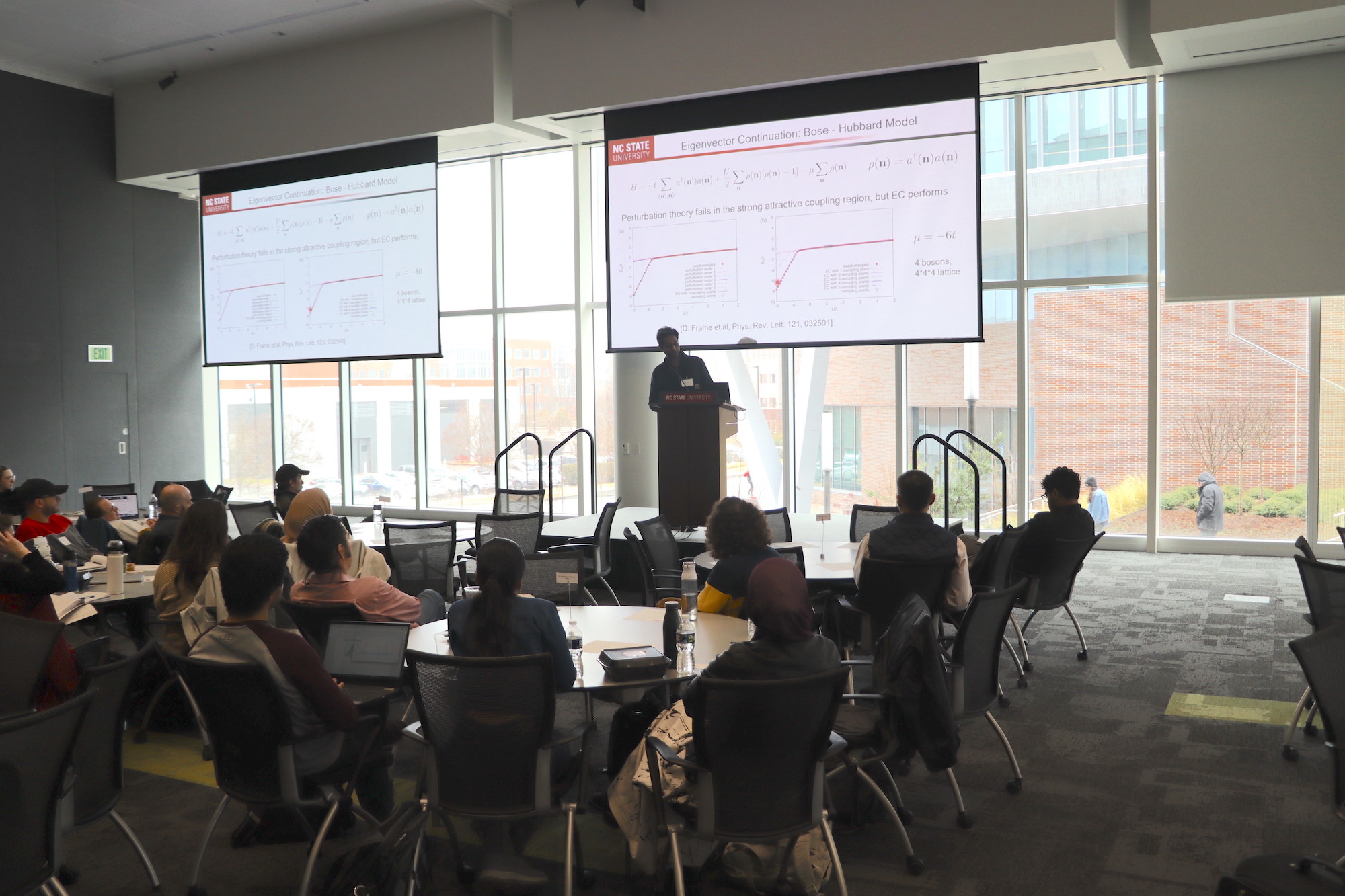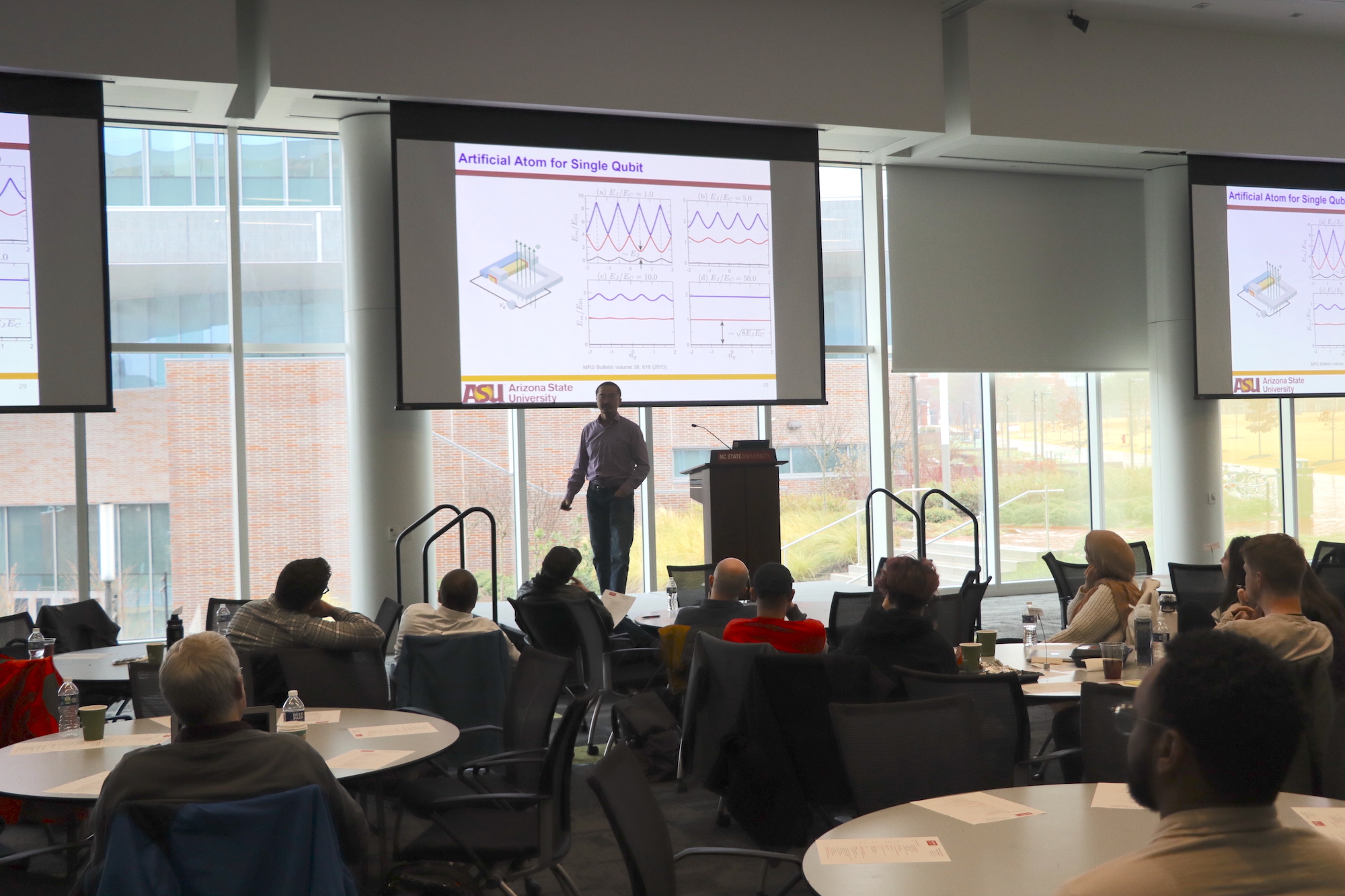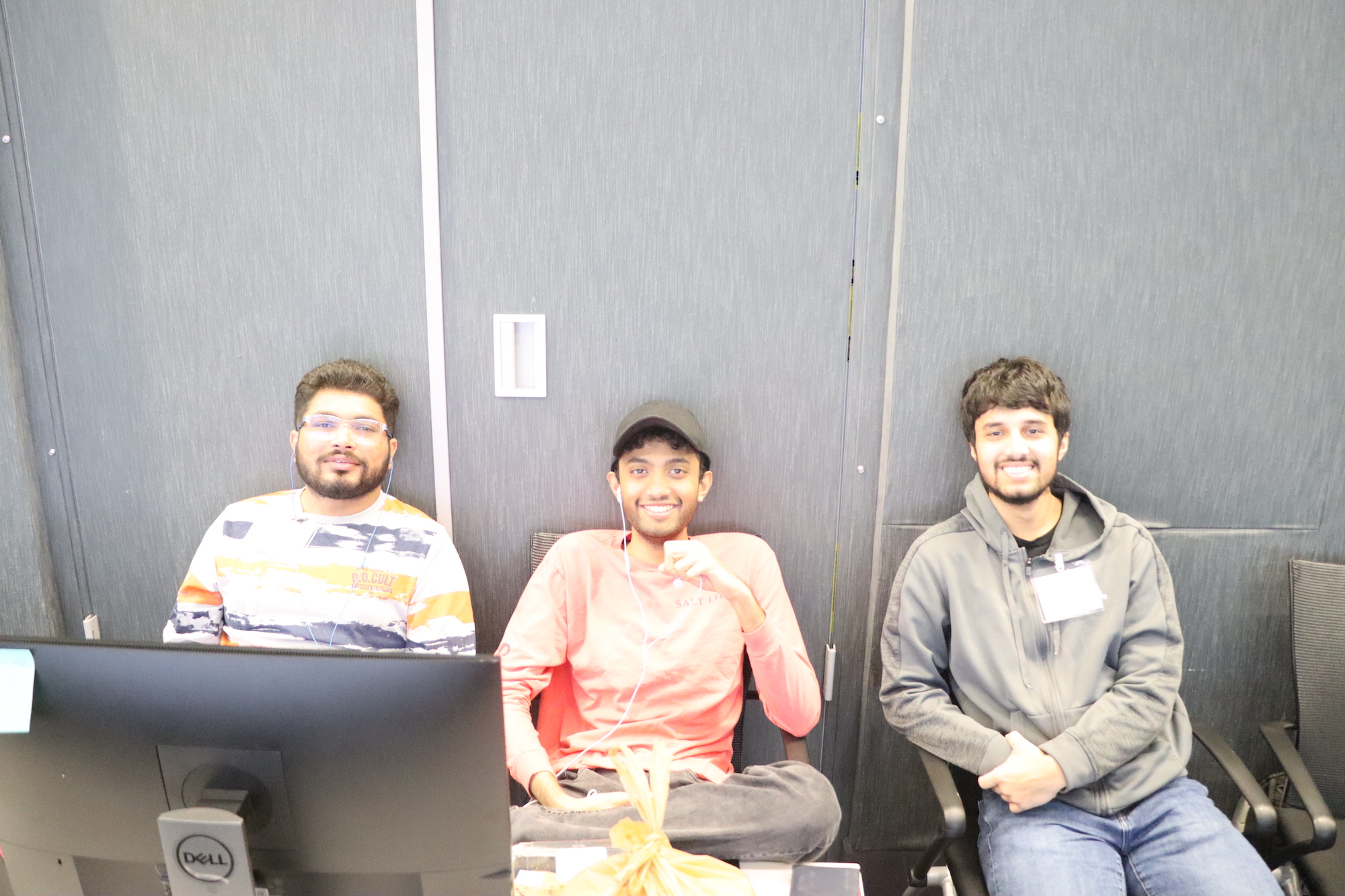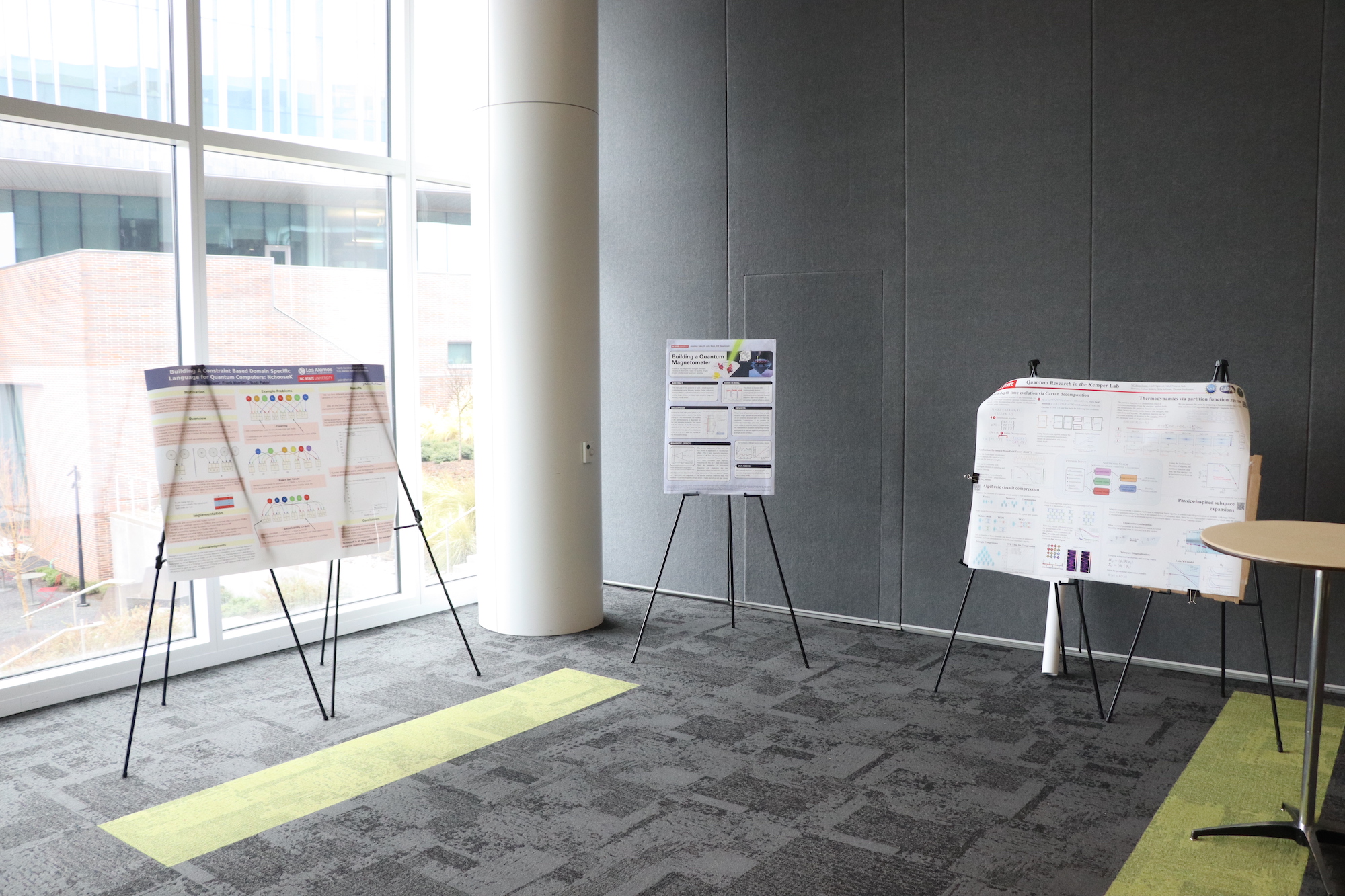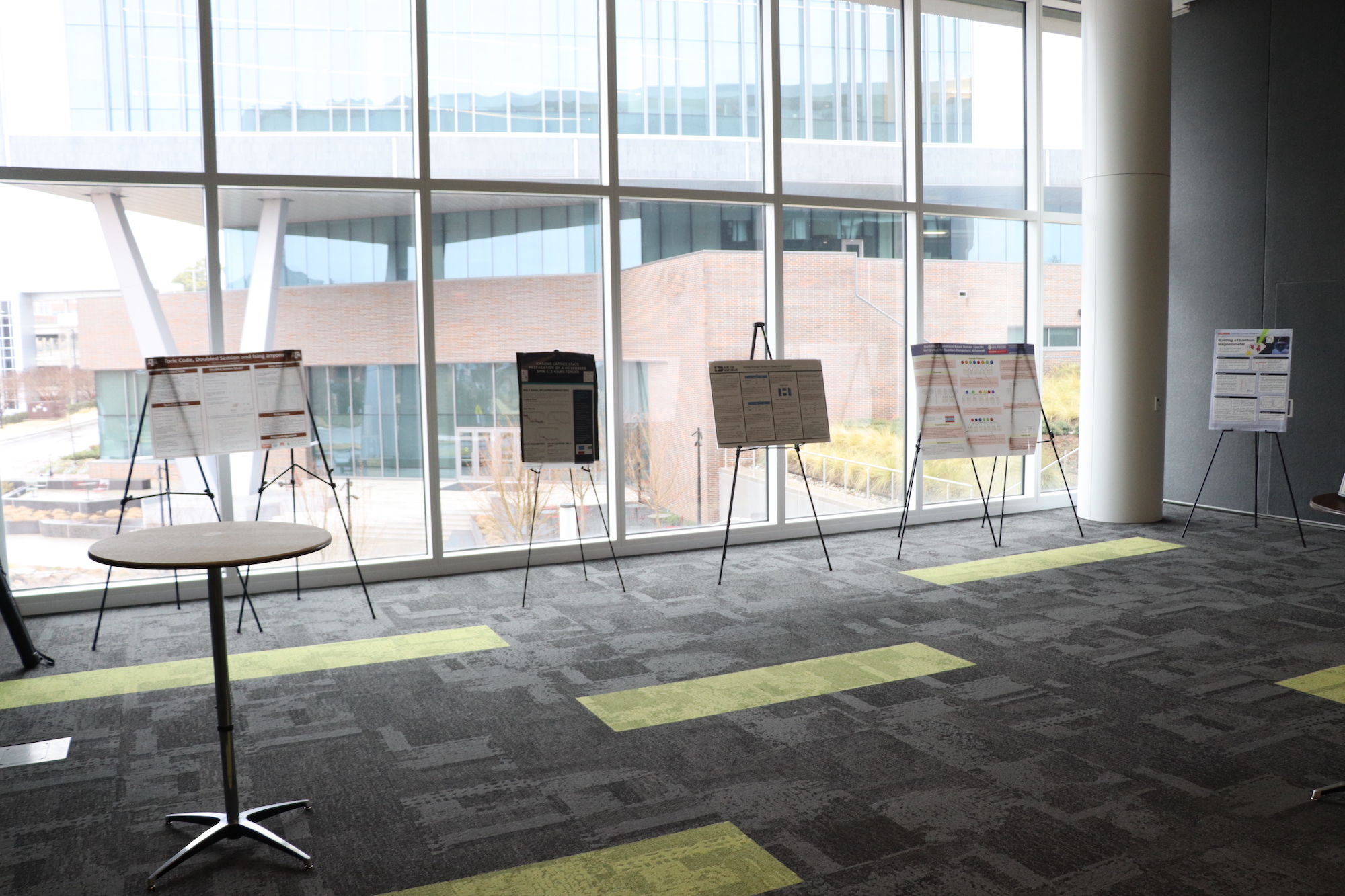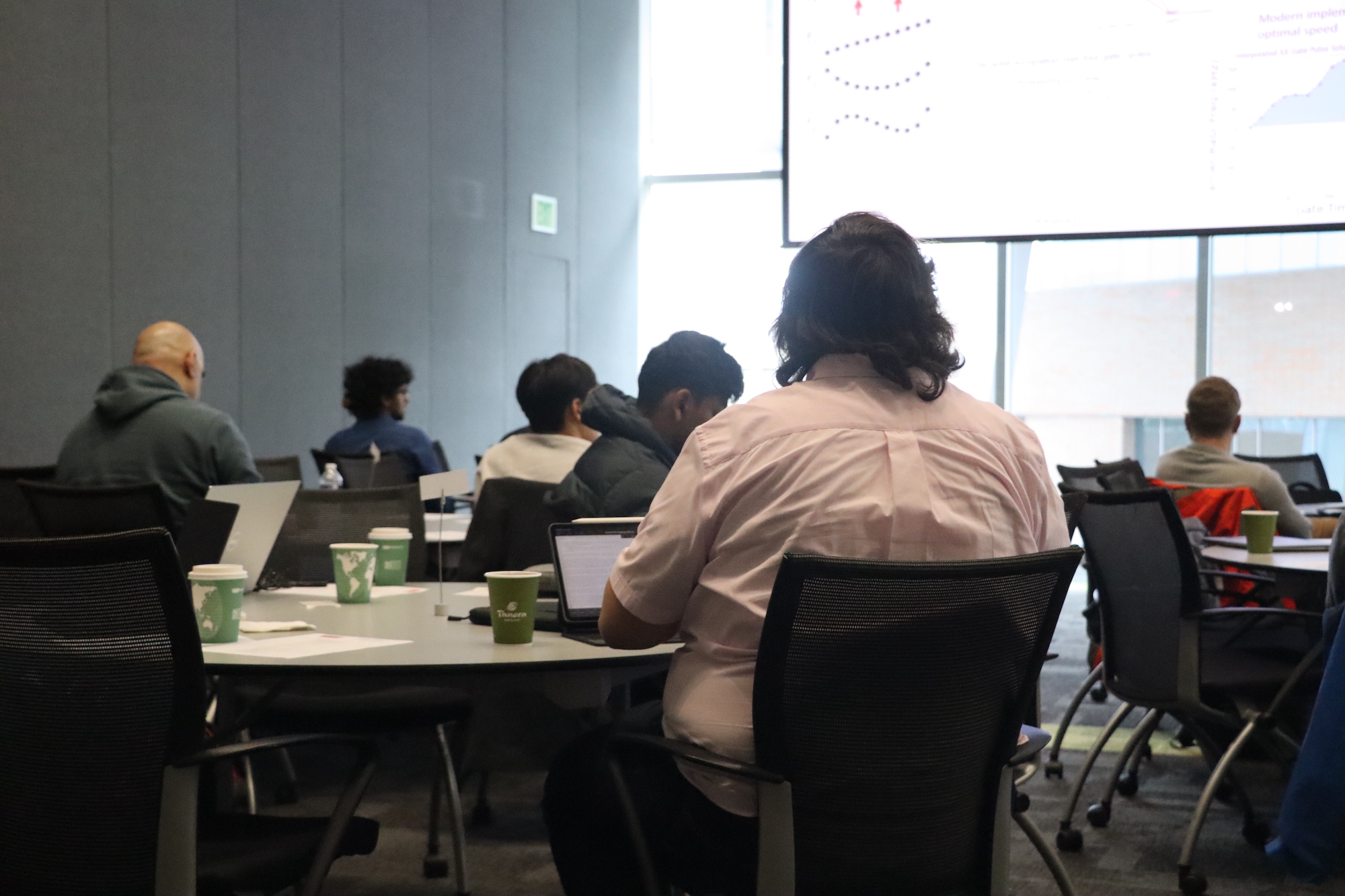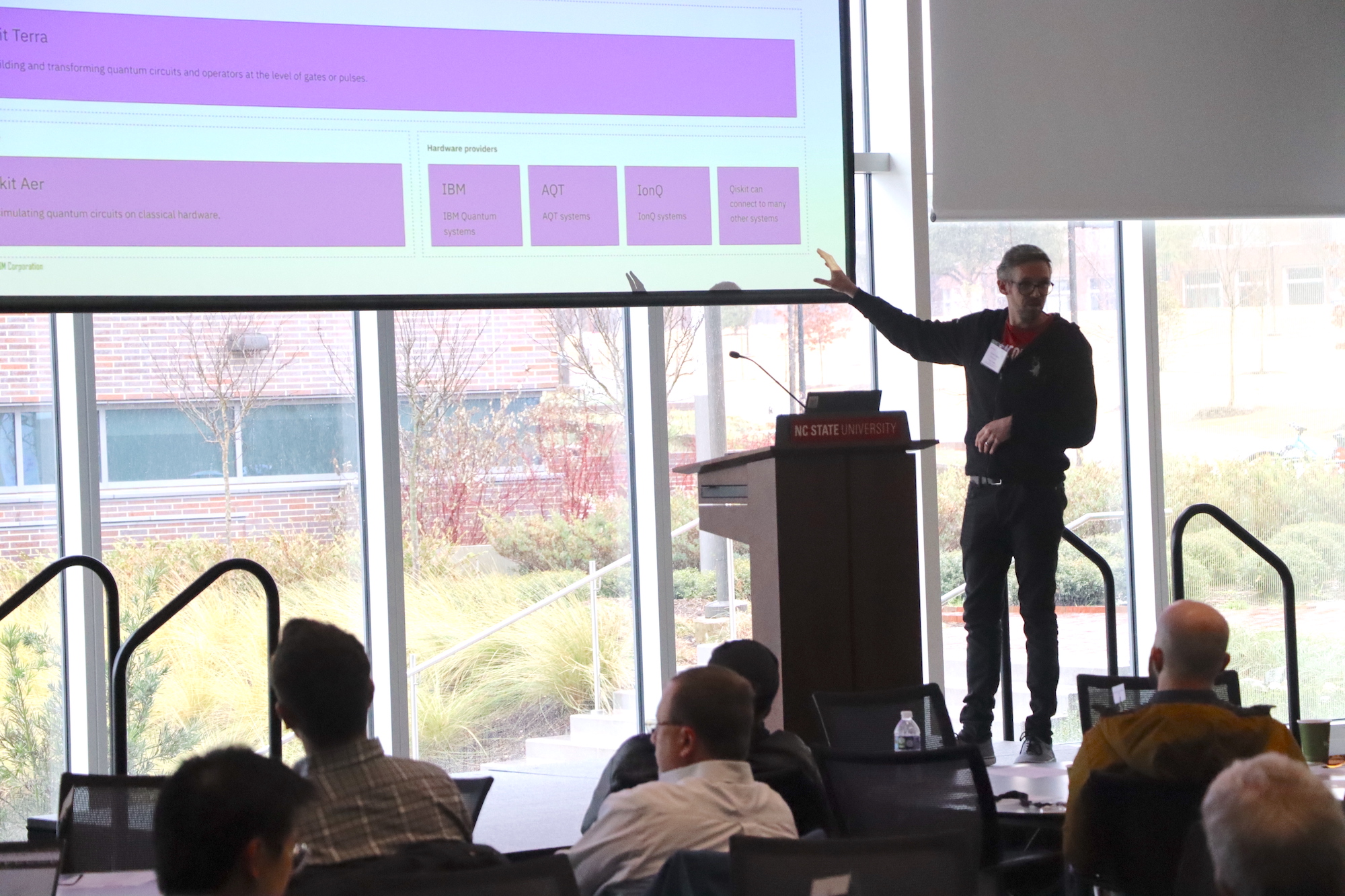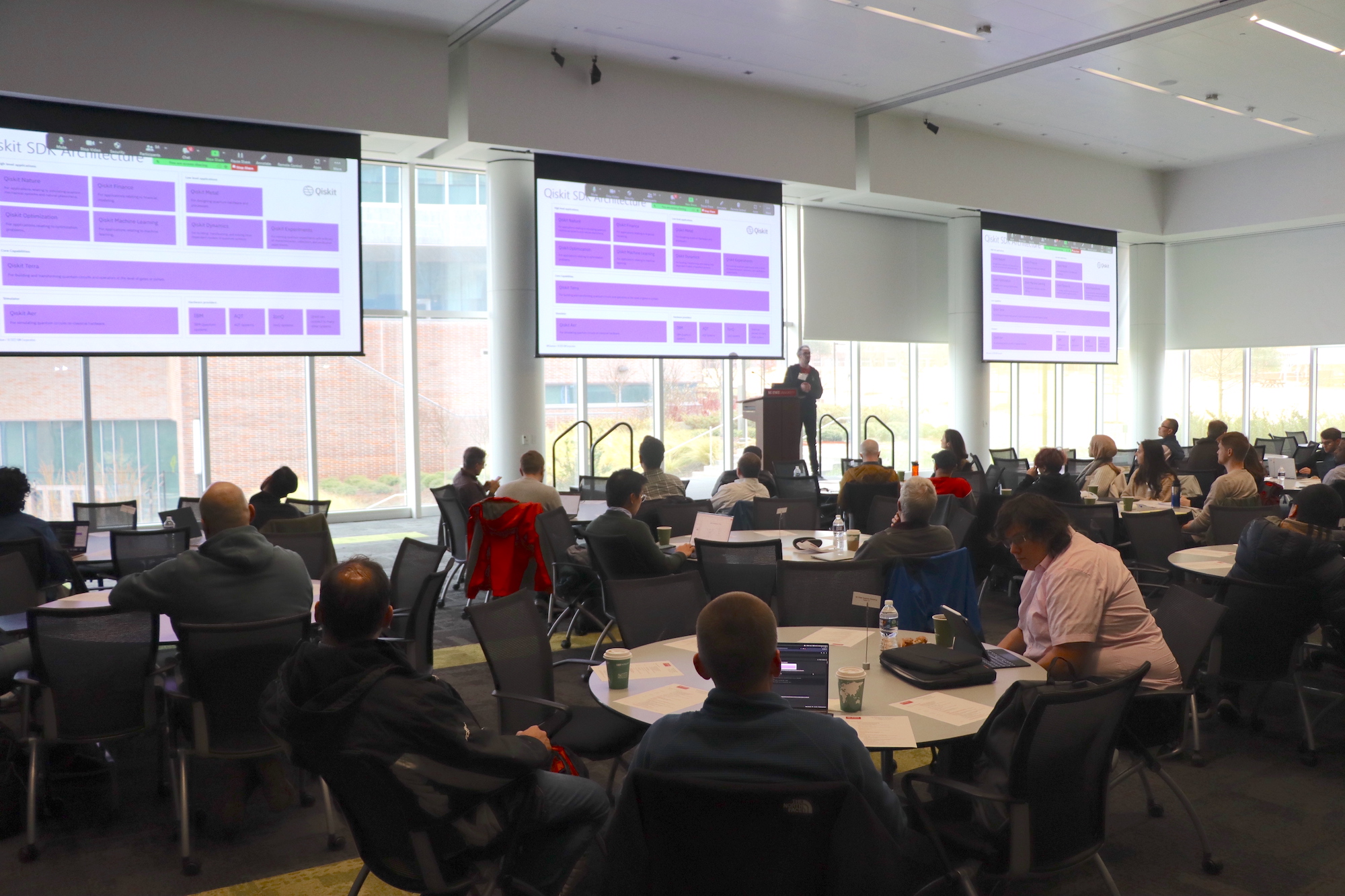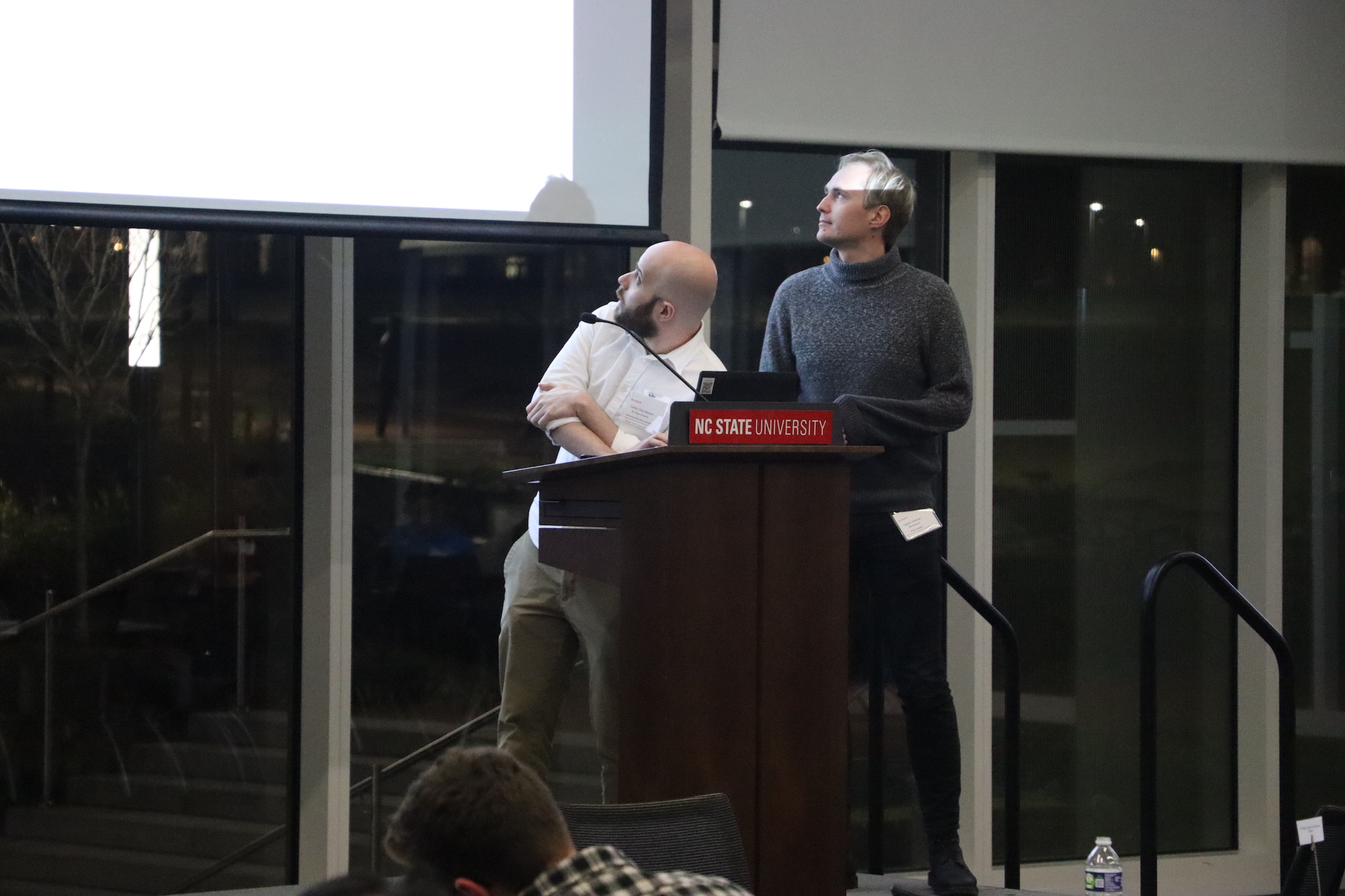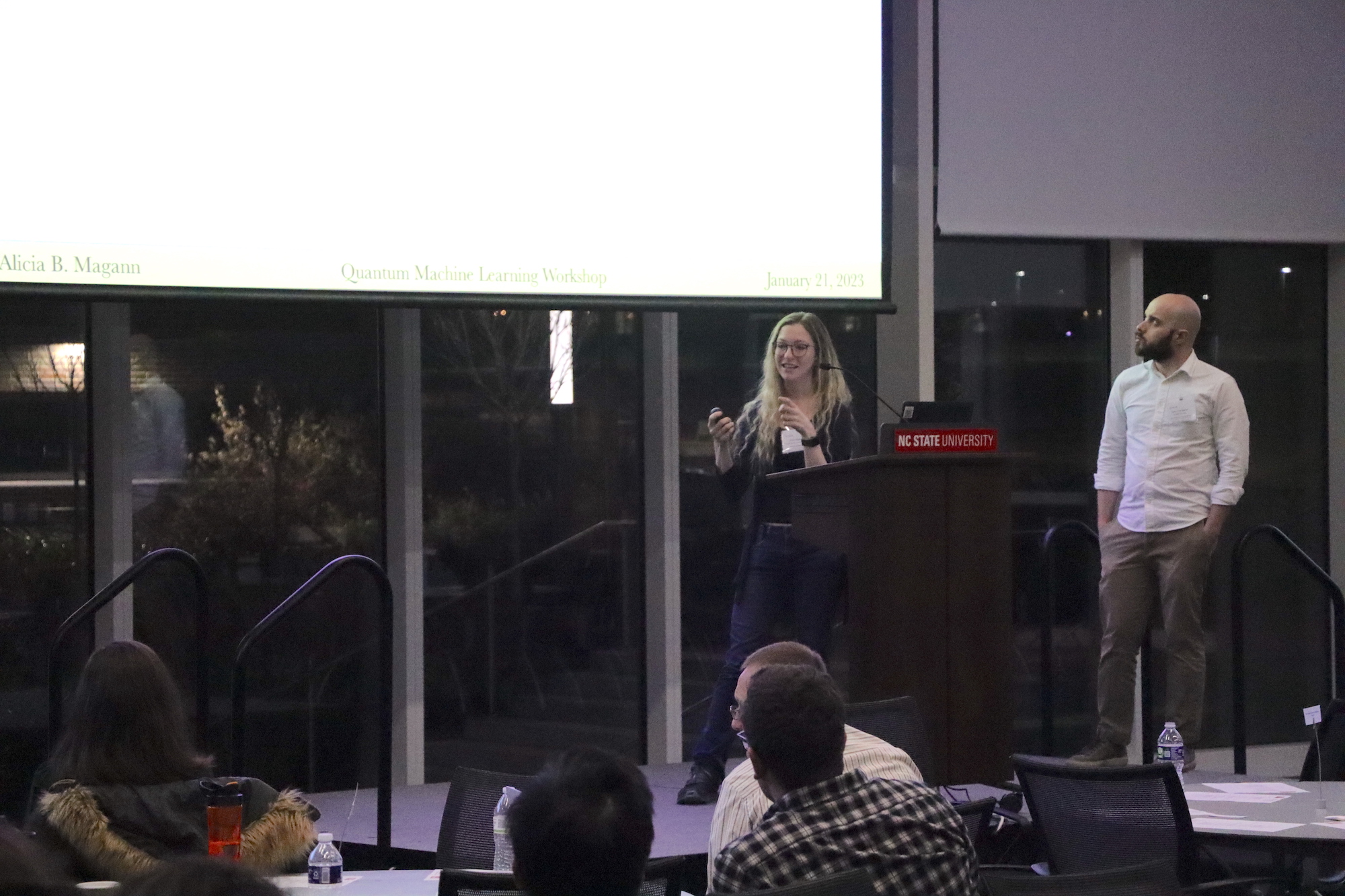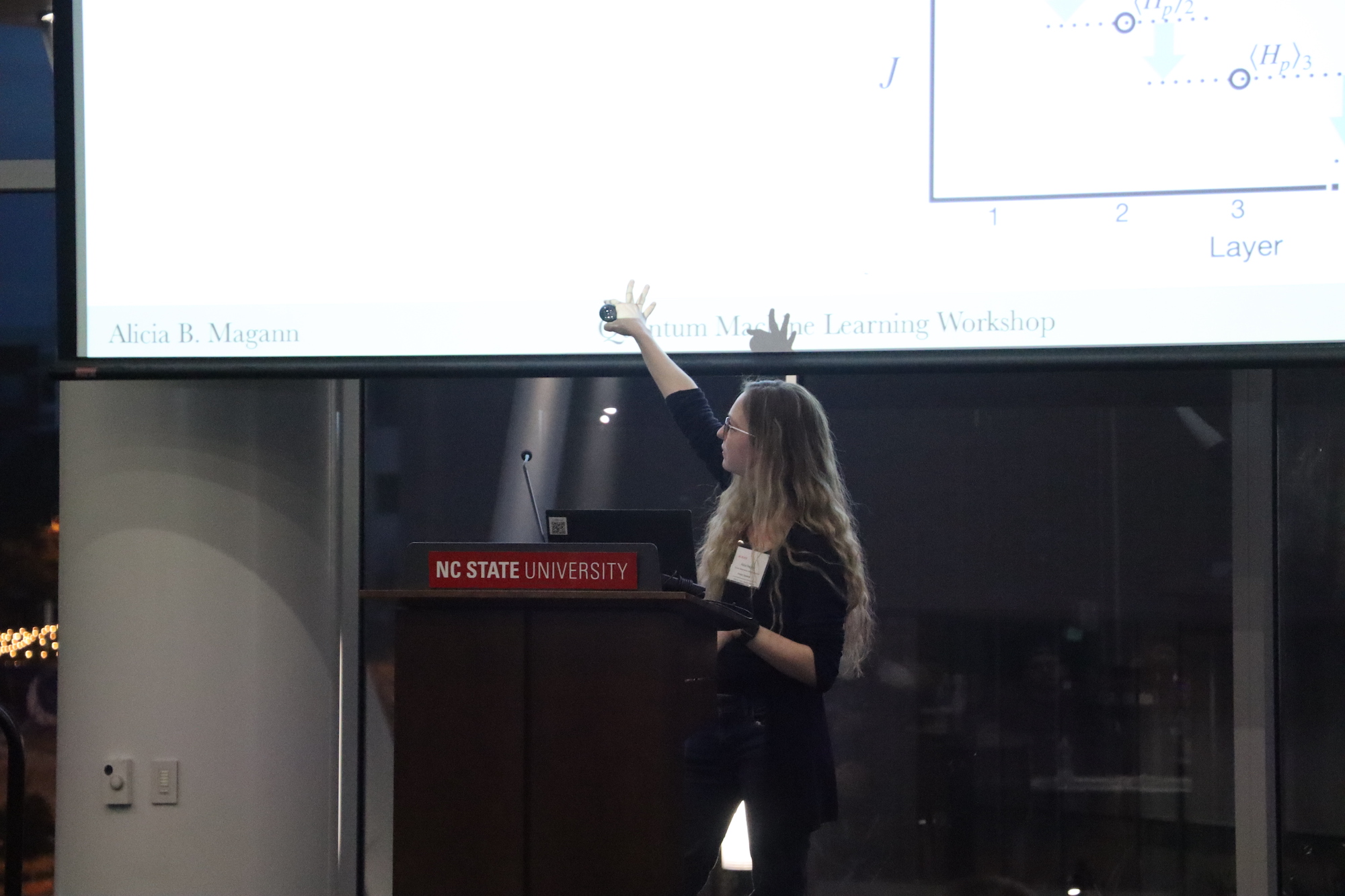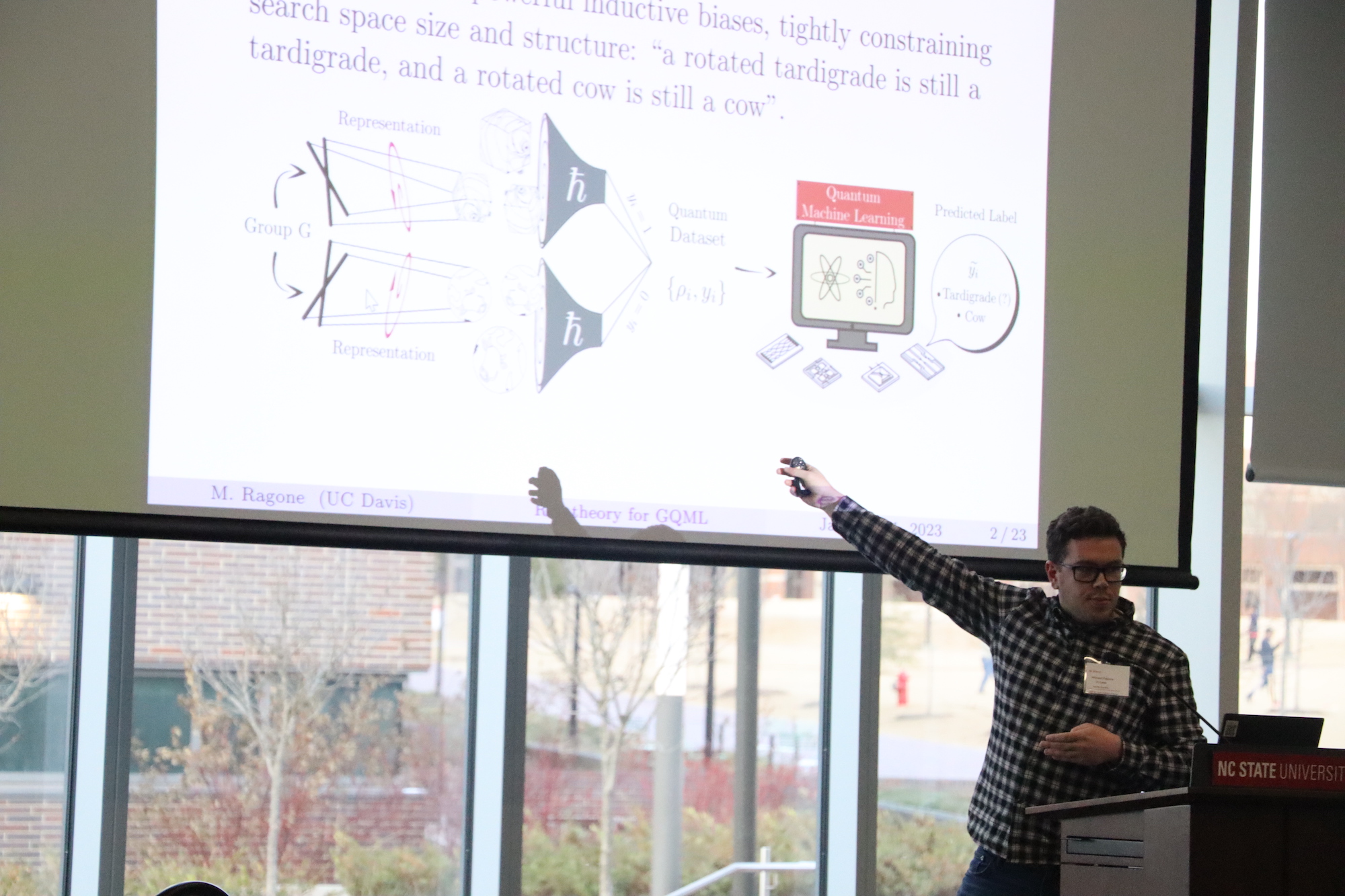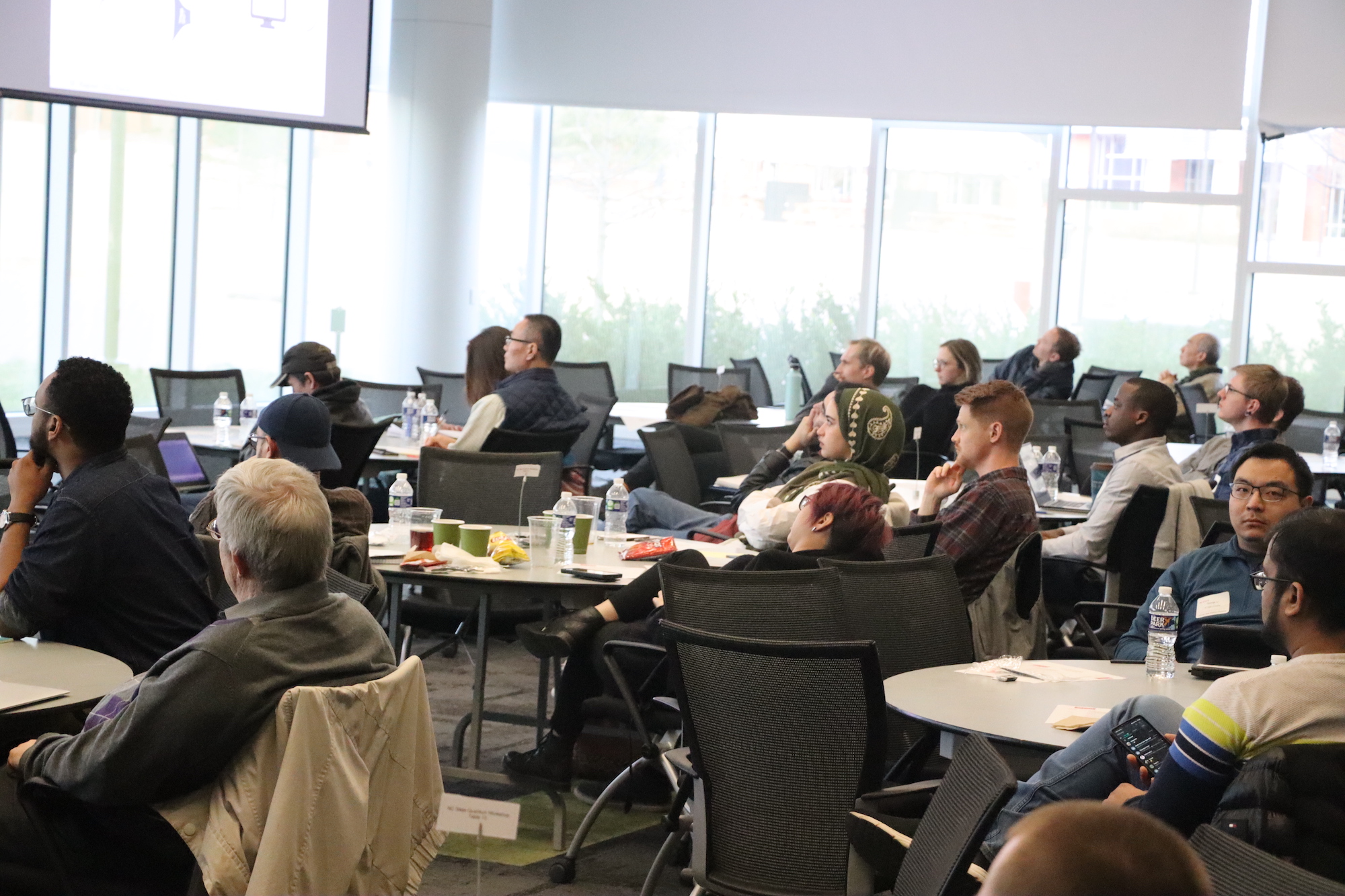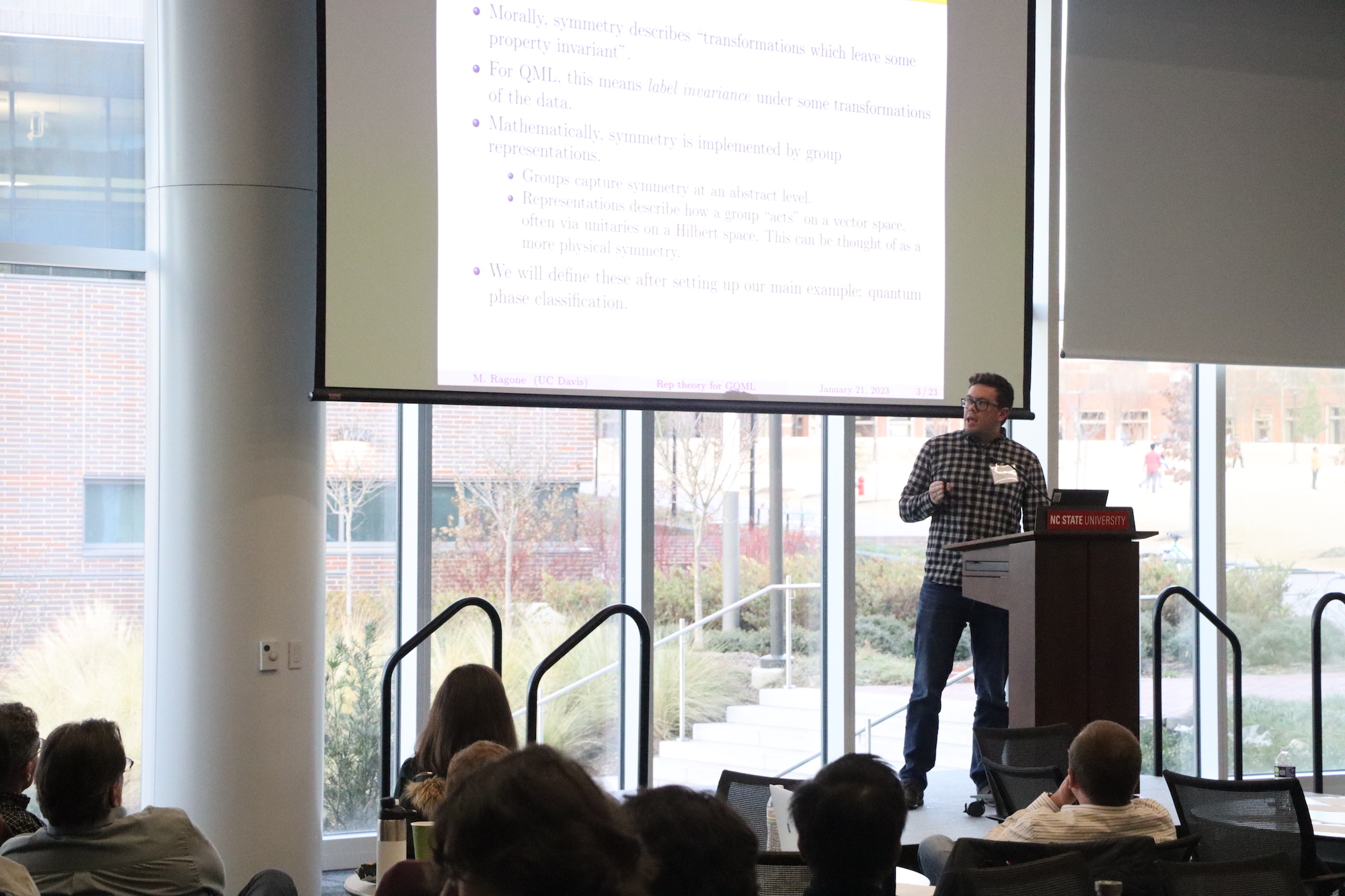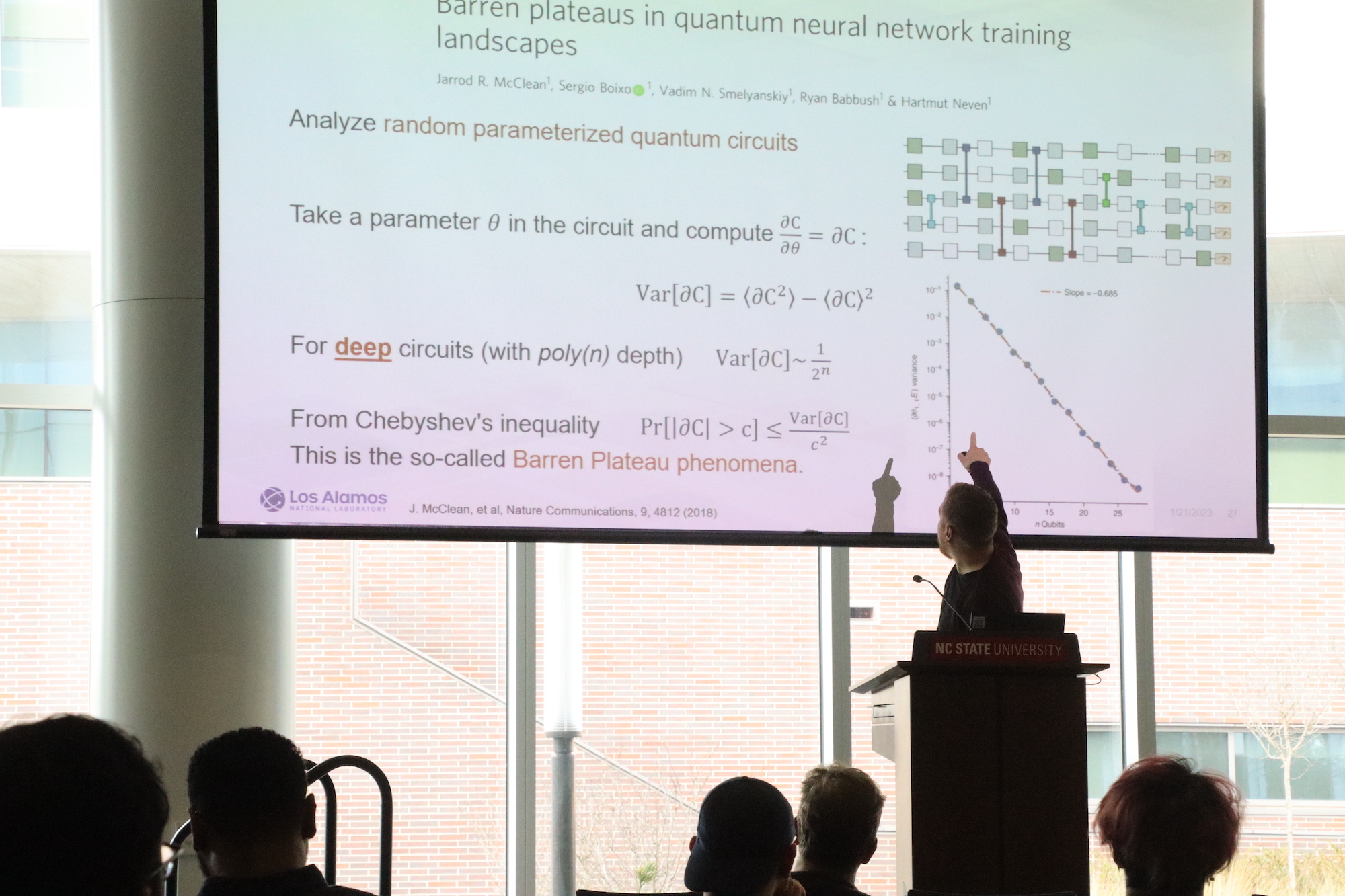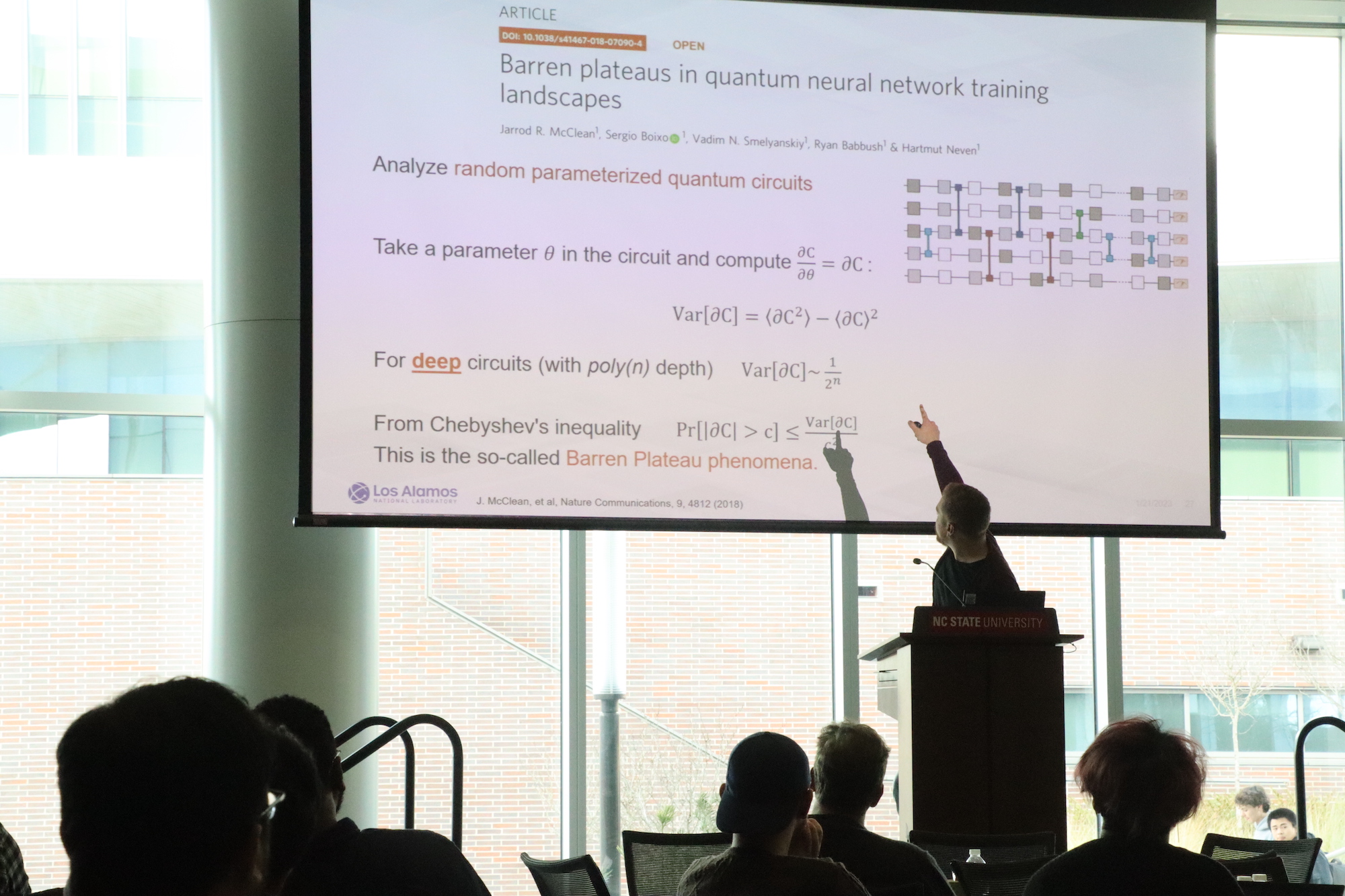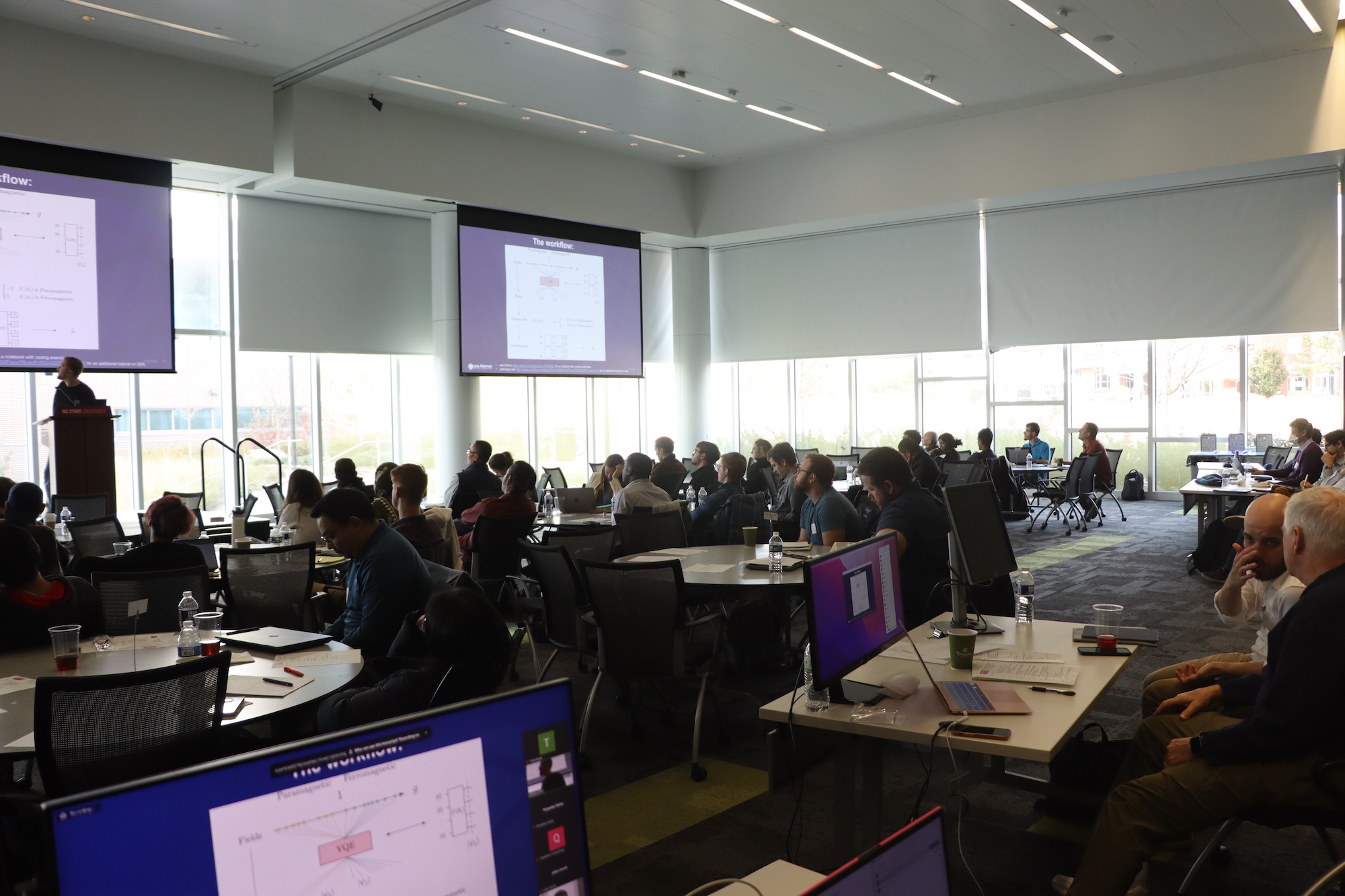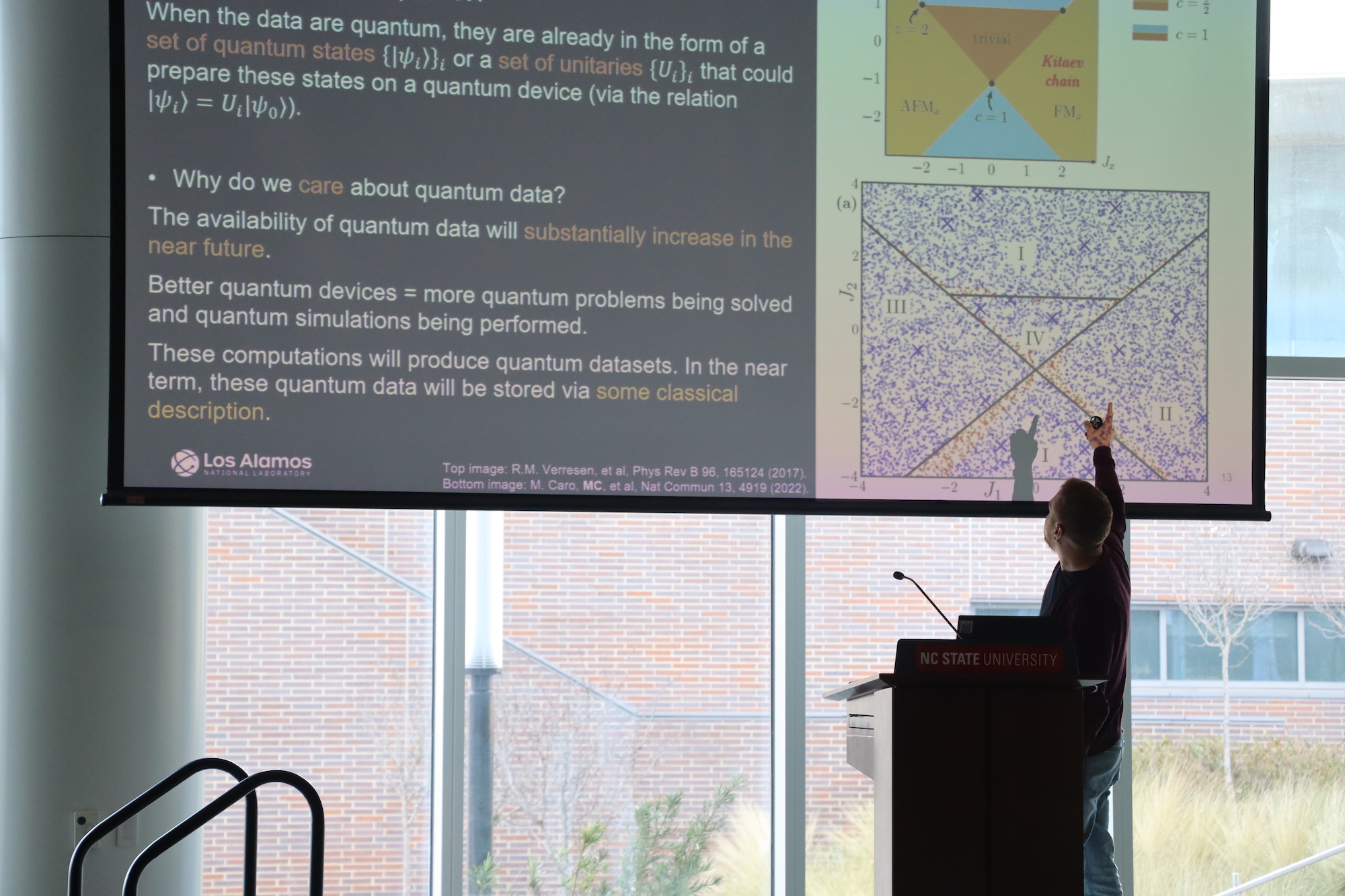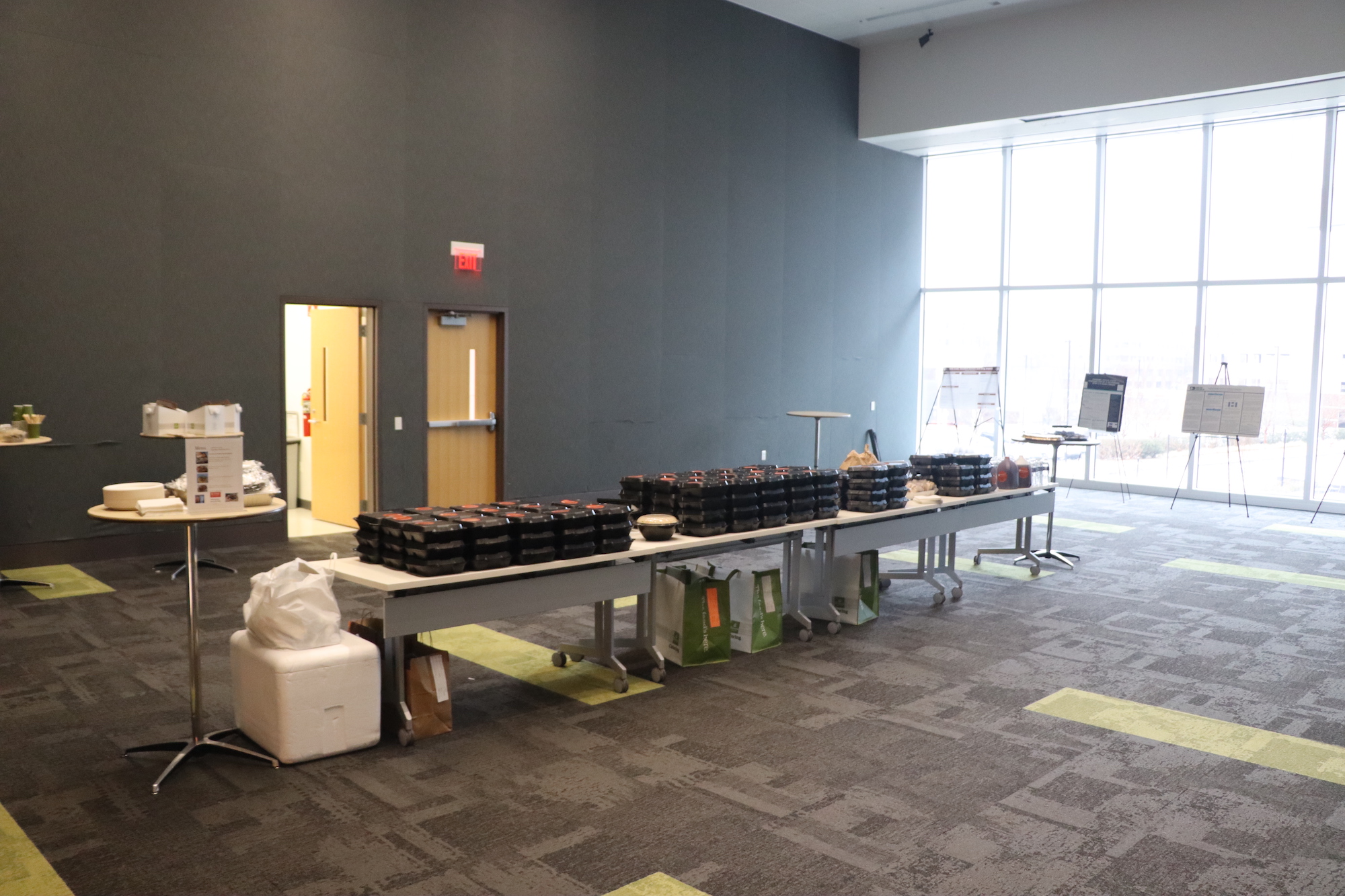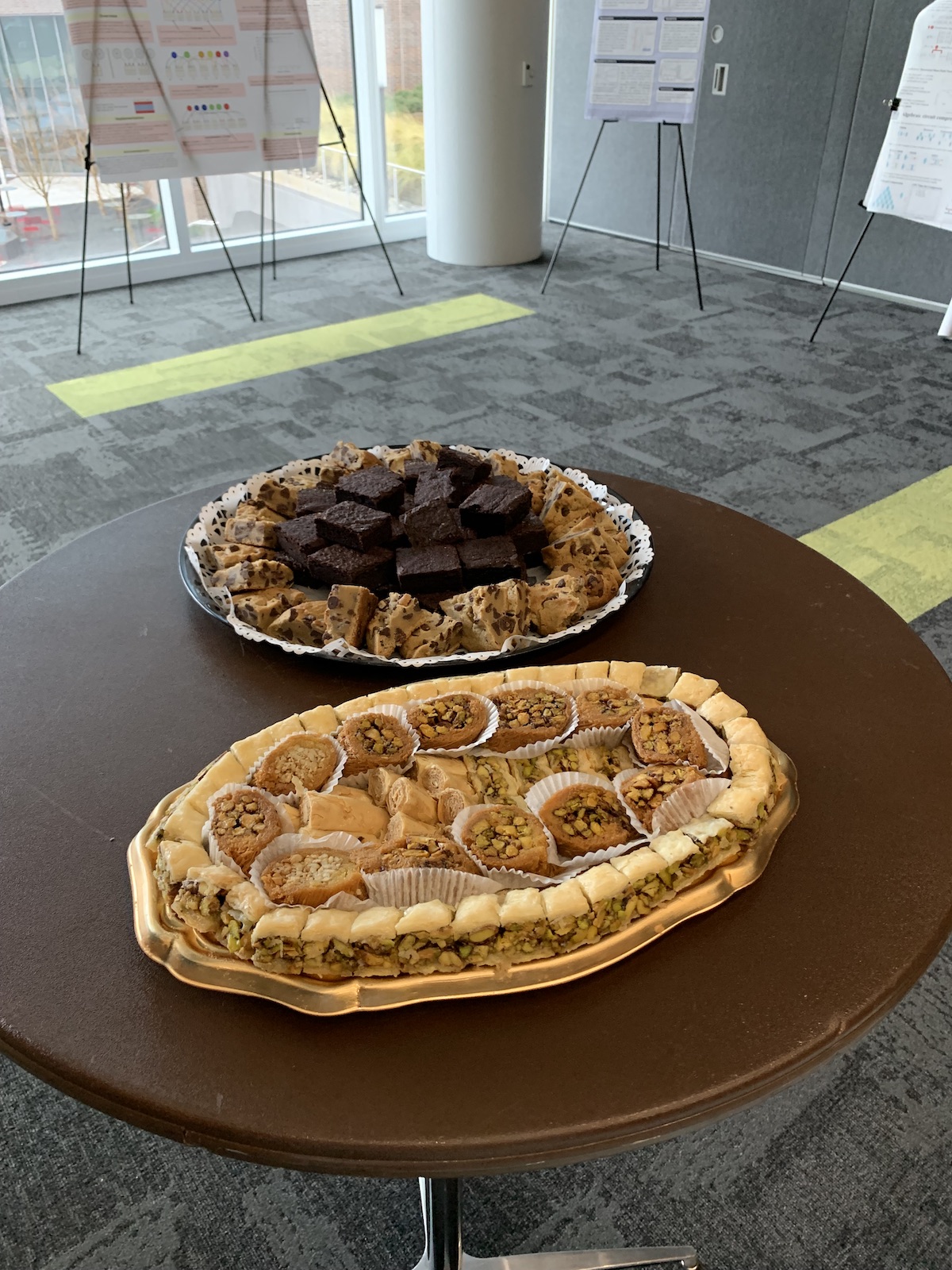January 2023 Workshop
January 2023 Workshop Menu
Event Details
Date: January 21 -22, 2023
Time: 9am – 6pm (both days)
Location: Duke Energy Hall, Hunt Library, Centennial Campus
Workshop recordings are currently being processed for posting. Thank you for your patience. Please continue to check back for 2023 Quantum Workshop materials.
Overview
NC State University is organizing a regional workshop in quantum computing for graduate students and researchers in the southeast US. The workshop will be co-sponsored by the IBM Quantum Innovation Center at NC State and will take place over the weekend of January 21-22, 2023. This will be a hybrid event providing an opportunity for students and researchers to learn more about quantum computing while networking with colleagues.
The theme for this year’s workshop is quantum machine learning (ML), which involves solving ML tasks by performing quantum operations. We are arranging tutorials and invited talks that highlight this quickly developing area. There will also be a poster session. Along with those specific tutorials, there will also be opportunities to engage in discussion of other more general areas in quantum computing. While the workshop is open to everyone, a background including courses in Linear Algebra and Probability will be helpful.
We hope that this quantum ML workshop will be the first in an annual series that will help grow our attendees’ understanding in the many areas of quantum! More information coming soon on our website.
Schedule
Day One
| Time (EDT) | Topic |
|---|---|
| 9:00 AM | Check-In at Duke Energy Hall, Hunt Library |
| 9:30 AM | Welcome and Introductions Organizers |
| 9:45 AM | Tutorial 1 - Quantum 101 Tutorial - Greg Byrd, NC State University (2 hours with short break at midpoint) Title - Introduction to Quantum Computing |
| 11:45 AM | Break (15 minutes) with snacks |
| 12:00 PM | Invited Speakers (30 minutes each) Dominik Hangleiter, University of Maryland and NIST Rebekah Ann Herrman, University of Tennessee Knoxville |
| 1:00 PM | Lunch (1 hour) |
| 2:00 PM | Tutorial 2 - Quantum ML Tutorial - Marco Cerezo, Los Alamos National Lab (2 hours with short break at midpoint) Title - A Primer on Quantum Machine Learning, Prospects and Challenges |
| 4:00 PM | Break (30 minutes) with snacks |
| 4:30 PM | Invited Speakers (30 minutes each) Jack Ceroni, University of Toronto Alicia Bette Magann, Sandia National Lab Michael Ragone, University of California Davis Vojtech Havlicek, IBM Research |
| 6:30 PM | End of Day 1 Workshop |
| No Host Social - Transfer Company Food Hall |
Day Two
| Time (EDT) | Topic |
|---|---|
| 9:30 AM | Check-In at Duke Energy Hall, Hunt Library |
| 10:00 AM | Tutorial 3 - Qiskit Tutorial - Richard Padbury, IBM Quantum Title - Introduction to the IBM Quantum Network and Qiskit |
| 11:00 AM | Break (30 minutes) with snacks |
| 11:30 AM | Tutorial 4 - IonQ Tutorial - Daiwei Zhu, IonQ Title - Quantum ML with Ion Trap Quantum Computers |
| 12:30 PM | Lunch (1 hour) |
| 1:30 PM | Invited Speakers (30 minutes each) Houlong Zhuang, Arizona State University Akhil Francis, NC State University |
| 2:30 PM | Thank You Organizers |
| 2:45 PM | Post Conference Discussion / Poster Session Additional time for questions and interaction with poster presentations |
| 4:45 PM | End of Day 2 Workshop |
Speakers
Tutorial Speakers
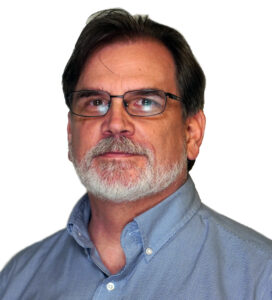
Greg Byrd
Professor, Associate Department Head, Electrical and Computer Engineering, NC State University
Bio
Greg Byrd is a professor and Associate Department Head of ECE at NC State. His research interests include quantum computing, computer architecture, and parallel systems. He is a co-author of Principles of Superconducting Quantum Computers (2022), and he was the general chair of the 2022 IEEE Intl. Conf. on Quantum Computing and Engineering.
Tutorial Title: Introduction to Quantum Computing
This tutorial will introduce the fundamental concepts of quantum computing, primarily from a programming and algorithms perspective. Topics include quantum bits (qubits), superposition, entanglement, quantum gates and circuits, and some important quantum algorithms. Knowledge of quantum mechanics is not required, but familiarity with basic linear algebra (vectors and matrices) is helpful. Emphasis will be placed on topics that will be further explored during the rest of the workshop.
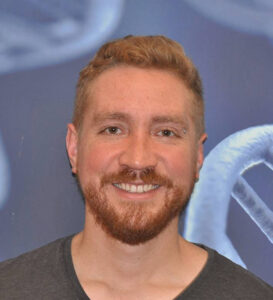
Marco Cerezo
PhD, Staff Scientist, Los Alamos National Laboratory
Bio
Dr. Marco Cerezo is a Guatemalan physicist currently working as a staff scientist at Los Alamos National Laboratory. His areas of expertise include near term quantum computing, quantum information and quantum sensing. For the past few years Marco has studied the performance of variational quantum learning models, proving results related to the existence of barren plateaus and the effect of hardware noise on quantum algorithms.
Tutorial Title: A primer on quantum machine learning, prospects and challenges
At the intersection of machine learning and quantum computing, quantum machine learning has the potential of accelerating data analysis, especially for quantum data, with applications for quantum materials, biochemistry and high-energy physics. In this tutorial we will introduce and review current methods and applications for quantum machine learning. We highlight differences between quantum and classical machine learning, with a focus on quantum neural networks and quantum deep learning. Finally, we discuss opportunities for quantum advantage with quantum machine learning.
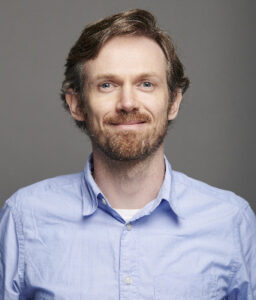
Richard Padbury
Academic Alliance Manager, Partner Ecosystem, IBM Quantum
Bio
Dr. Richard Padbury is the Academic Alliance Manager at IBM Quantum, where he facilitates relationships and coordinates collaborations across IBM and academic partner research teams. Richard has over 10 years’ experience co-advising research projects in collaboration with academic, government and industrial organizations and has over 5 years’ experience consulting for R&D and product development teams spanning the healthcare, aerospace, energy, and automotive industries. Richard holds a BS in Physics from University of Manchester, UK and a PhD in Polymer Science from NC State University.
Tutorial Title: Introduction to the IBM Quantum Network and Qiskit
Richard started his quantum journey in November 2021. In this tutorial, Richard will share his peronsal experience learning Qiskit and the resources that he used to learn how to program real IBM quantum systems. The goal of the tutorial is to provide blueprint that attendess can use to get started on their quantum journey but, also highlight how easy it is to customize their learning pathway. For context, Richard will briefly introduce his background, the IBM quantum Network and IBM Quantum Roadmap. The tutorial will highlight the latest structure of Qiskit, the core modules available and then dive in to some specific examples using the resouces available on the IBM Quantum Experience and IBM Quantum Labs. The tutorial will conclude with an overview of the latest tools developed by IBM Quantum that can be used for research and education and how attendees can get involved with the Qiskit community.
IBM Quantum Experience (IQX) Account
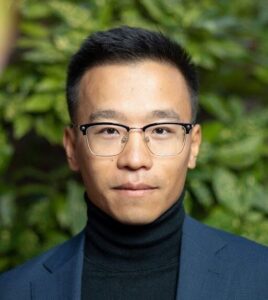
Daiwei Zhu
Senior Application Scientist, IonQ
Bio
Daiwei Zhu is a senior application scientist at IonQ. He earned his Ph.D. in 2021, working with Christopher Monroe at the University of Maryland, developing trapped-ion quantum computers and algorithms targeting near-term quantum devices. His research interests include quantum algorithms, hardware-based quantum algorithm optimization, verification and characterization of quantum devices, and quantum machine learning.
Tutorial Title: Quantum machine learning with ion trap quantum computers
Quantum machine learning is one of the most promising directions in the field of quantum computing. Due to its heuristic nature in general, practical applications of quantum machine learning algorithms crucially rely on experiments with actual quantum computers. This tutorial features an implementation of a quantum generative modeling algorithm on an ion trap quantum computer. We first give an intuitive introduction to the physics of ion trap quantum computers, and then walk through a Jupyter notebook showing how to run the algorithm on an IonQ Aria quantum computer.
Invited Speakers

Jack Ceroni
Undergraduate Student, University of Toronto
Bio
I am a third-year undergraduate student at the University of Toronto, pursuing a degree in pure mathematics. In the past, I have worked for Xanadu as a quantum algorithms research intern, and currently, I am taking a gap year from school to work at a new quantum computing startup.
Title: Generating Approximate Ground State of Molecules Using Quantum Machine Learning
I will be discussing our paper, which has the same title as the title of the talk, on training hybrid classical-quantum neural networks to generate ground states of molecules on quantum devices. I will discuss the architecture used, rigorous sample bounds on training the model, lower bounds derived on the amount/type of training data needed to train models of a similar form, and extensive numerics, where we show the effectiveness of our approach.
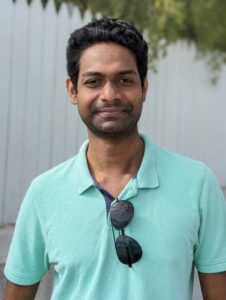
Akhil Francis
Graduate Student, NC State University
Bio
Akhil Francis is a physics Ph.D. student at North Carolina State University (NCSU) working under the supervision of Dr. Alexander Kemper. His research is primarily in using quantum computation to solve condensed matter physics problems, especially using noisy intermediate-scale quantum (NISQ) machines. He is also interested in benchmarking quantum machines as well as in employing machine learning tools to explore quantum computing data.
Title: Subspace Diagonalization on Quantum Computers using Eigenvector Continuation
Quantum subspace diagonalization (QSD) methods are quantum-classical hybrid methods, commonly used to find ground and excited state energies by projecting the Hamiltonian to a smaller subspace. In applying these, the choice of subspace basis is critical from the perspectives of basis completeness and efficiency of implementation on quantum computers. In this work, we present Eigenvector Continuation (EC) as a QSD method, where low-energy states of the Hamiltonian at different points in parameter space are chosen as the subspace basis. This unique choice enables rapid evaluation of low-energy spectra, including ground and nearby excited states, with minimal hardware effort. As a particular advantage, EC is able to capture the spectrum across ground state crossovers corresponding to different symmetry sectors of the problem. We demonstrate this method for interacting spin models and molecules.
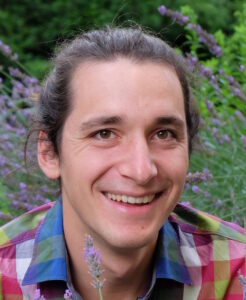
Dominik Hangleiter
Hartree Postdoctoral Fellow, QuICS (University of Maryland & NIST)
Bio
Dominik is a quantum scientist working at the interface between computer science, mathematics and physics, as well as the philosophy of quantum science. In his research, he explores the potential of analog and digital quantum computing devices from the theoretical perspective of computational complexity and classical simulation algorithms, and tries to understand the physical mechanisms underlying their speedups. In collaboration with experimental groups, he develops and applies resource-efficient characterization tools to help improve those devices. He also enjoys thinking about methodological aspects of science in general, and quantum science in particular from a philosophy of science point of view. Dominik studied physics, philosophy, and mathematics in Konstanz, Oxford and Munich, and received his Ph.D. from Freie Universität Berlin.
Title: Is there an advantage of quantum learning?
Quantum machine learning has been hailed as one of the promising near-term applications of small quantum computers and much research is focused on devising quantum heuristics that might yield an advantage over classical learning algorithms. In this talk, I want to take a step back and ask: To what extent can we hope for a quantum advantage in machine learning? I will begin by introducing different models of learning. I will then focus on the following task: Given samples from some unknown discrete probability distribution, output an efficient algorithm for generating new samples from that distribution. I will first present a result showing that for very specific distributions the answer is a resounding “Yes!”. Then, I will present some results on the learnability of the output distributions of quantum circuits—a natural general setting in which one might hope for a quantum advantage.
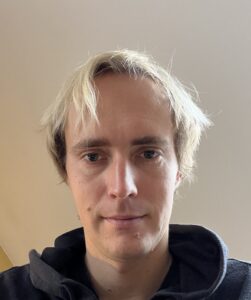
Vojtech Havlicek
Research Staff Member, Quantum Algorithms, IBM Research, Yorktown Heights, US
Bio
DPhil, University of Oxford (2020). IBM (2020-).
Title: Amplitude Ratios and Neural Network Quantum States
Neural Network Quantum States (NQS) represent quantum wavefunctions with artificial neural networks. We study the wavefunction access provided by NQS in (Carleo and Troyer; Science. 355, 2017) and relate it to results from distribution testing. This leads to improved distribution testing algorithms for such NQS. It also motivates an independent definition of a wavefunction access model: the amplitude ratio access. We compare it to blackbox and sample and query access models, previously considered in the study of dequantization of quantum algorithms. First, we show that the amplitude ratio access is strictly stronger than blackbox access. Second, we argue that the amplitude ration access is strictly weaker than sample and query access, but also show that it retains many of its simulation capabilities. Lastly, we use the connection to distribution testing algorithms to give an NQS with just three nodes that does not encode a valid wavefunction and cannot be sampled from.
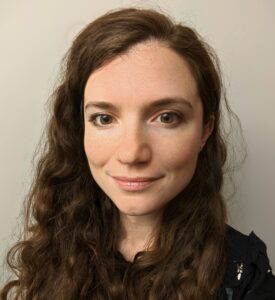
Rebekah Herrman
Assistant Professor, Industrial and Systems Engineering, University of Tennessee Knoxville
Bio
Dr. Rebekah Herrman is an Assistant Professor in the Industrial and Systems Engineering department at the University of Tennessee Knoxville. She received her Ph.D. in mathematics in 2020 from the University of Memphis with a focus in combinatorics, specifically graph theory optimization. Her current research interest is graph theory applications in quantum computing. Dr. Herrman is a 2022 DARPA Forward Riser and 22-23 APS Career Mentoring Fellow.
Title: Overparameterization and the quantum approximate optimization algorithm
The quantum approximate optimization algorithm (QAOA) is a leading algorithm for solving combinatorial optimization problems on quantum devices. The algorithm relies on two alternating operators acting on an initial quantum state, and each operator has a real valued parameter input that is determined by a classical subroutine. Recently, modifications to QAOA have been introduced that require more parameters than the original algorithm. While this increases the difficulty of the classical subroutine, the incorporation of additional parameters into QAOA often leads to better approximation ratios and decreased quantum circuit depth. In this talk, we will discuss some of these modified algorithms and the effects of additional parameters on the algorithm output.
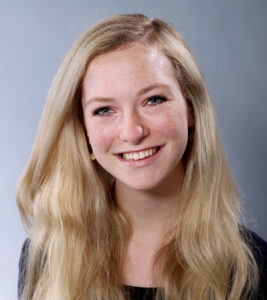
Alicia B. Magann
Truman Fellow, Quantum Algorithms & Applications Collaboratory, Sandia National Laboratories
Bio
Alicia Magann is a Truman Fellow in the Quantum Algorithms and Applications Collaboratory at Sandia National Laboratories. Previously, she completed her PhD at Princeton University. Her research centers on quantum control, quantum algorithms, and intersections between these two fields.
Title: Feedback-based quantum algorithms
It is widely hoped that quantum computers will be useful for optimization and machine learning, and over the last several years, there has been significant interest in variational quantum algorithms (VQAs) that target these two applications. VQAs operate by wrapping a classical optimization loop around a parameterized quantum circuit, and iteratively searching for the parameter configuration that produces the best solution to the problem under consideration. A critical challenge in VQAs is the difficulty of solving this classical optimization problem, which can become intractable in high dimensions.
I will introduce feedback-based quantum algorithms (FQAs) as an alternative paradigm that is optimization-free. Within this paradigm, quantum circuit parameter values are assigned in a layer-wise manner using a feedback law derived from quantum control principles. The use of feedback in this manner ensures an improvement in solution quality as the depth of the quantum circuit increases. I will begin by overviewing the relevant ideas from quantum control theory, go on to discuss concrete formulations of FQAs for combinatorial optimization and machine learning, and conclude by exploring their performance in simulation and on real quantum hardware.
Sandia National Labs is managed and operated by NTESS under DOE NNSA contract DENA0003525. SAND2022-16203 A.
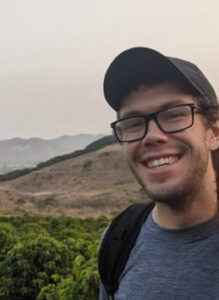
Michael Ragone
PhD Candidate, Mathematics, University of California, Davis
Bio
I work on mathematical physics with advisor Bruno Nachtergaele. I enjoy working on a variety of mathematically rigorous problems across the theories of quantum many body physics, quantum information, and quantum computation.
Title: Representation theory for geometric quantum machine learning
The young field of Geometric Quantum Machine Learning (GQML) seeks to create QML architectures which respect the symmetries of input data. Representation theory, a mathematical language of symmetry, has proven to be invaluable across quantum theory and classical machine learning, and its ability to restrict the spaces of available functions for a problem is expected to be highly useful in QML. In this expository talk, we briefly lay a framework for representation theory applied to GQML and focus on some illuminating examples of the approach. This is joint work from the Quantum Computing Summer School 2022 at Los Alamos National Laboratory, and is described in greater depth in these two preprints: arXiv:2210.07980, arXiv:2210.08566.
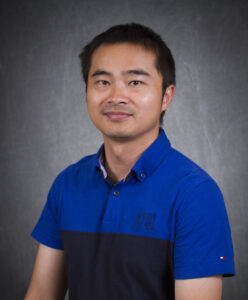
Houlong Zhuang
Assistant Professor, School for Engineering of Matter, Transport and Energy, Arizona State University
Bio
Dr. Houlong Zhuang is currently an Assistant Professor in the School for Engineering of Matter, Transport and Energy at Arizona State University. He obtained his doctorate in Materials Science and Engineering at Cornell University in 2014. He worked as a postdoctoral researcher at Oak Ridge National Laboratory from 2014-2015, and as a postdoctoral fellow at Princeton University from 2015-2017. He was trained as a theoretical and computational materials scientist in various fields of materials science and engineering, especially in energy-related areas including catalysis, lightweight metal alloys, two-dimensional materials, and solid/liquid interfaces. His current research is focused on applying quantum mechanical simulations, machine learning, and quantum computing calculations to tackle issues such as hydrogen storage and direct air capture for a sustainable energy and environment future. Dr. Zhuang is a recipient of the NSF CAREER Award and Materials Today Rising Star Award in 2022. He is a Scialog Fellow for Negative Emissions Science and a Fellow of the International Association of Advanced Materials.
Title: Materials Design in the Information Age and Beyond
Materials discovery has been greatly accelerated by techniques of artificial intelligence in the modern Information Age. But we are also expecting critical challenges from big materials data to computationally intense machine learning processes, as Moore’s law is coming to an end. Quantum computers, which use quantum superposition and interference to perform computations, hold great potential in handling big data and accelerating the optimization algorithms ubiquitous in machine learning models. As more and more quantum bits become available, the dawn of the Quantum Age is approaching us at speed. In this talk, I will use a new family of materials called high-entropy materials (HEMs) as an example to demonstrate how classical and quantum computers join forces to discover new HEMs that exhibit excellent properties, and to prepare for the upcoming challenges in materials discovery.
Photo Gallery
Recordings and Materials
| Speaker | Title | Resources |
|---|---|---|
| Greg Byrd | Quantum 101 Tutorial | Recording Slide Deck |
| Marco Cerezo | Quantum ML Tutorial | Recording Slide Deck |
| Houlong Zhuang | Materials Design in the Information Age and Beyond | Recording Slide Deck |
| Daiwei Zhu | Quantum ML with Ion Trap Quantum Computers | Recording |
| Michael Ragone | Representation Theory for Geometric Quantum Machine Learning | Recording Slide Deck |
| Alicia B. Magann | Feedback-Based Quantum Algorithms | Slide Deck |
| Dominik Hangleiter | Is There an Advantage of Quantum Learning? | Recording Slide Deck |
| Richard Padbury | Introduction to the IBM Quantum Network and Qiskit | Recording Slide Deck |
| Rebekah Herrman | Overparameterization in the quantum approximate optimization algorithm | Recording Slide Deck |
| Akhil Francis | Subspace Diagonalization on Quantum Computers using Eigenvector Continuation | Recording Slide Deck |
